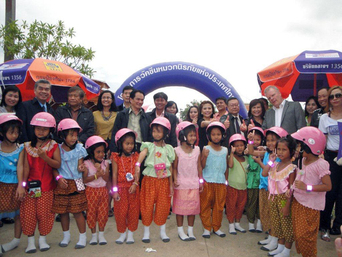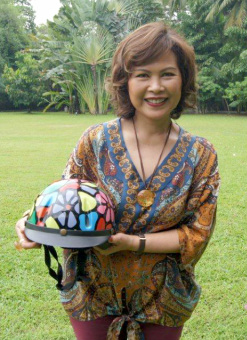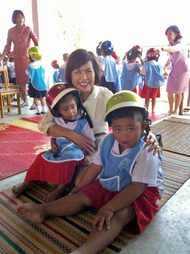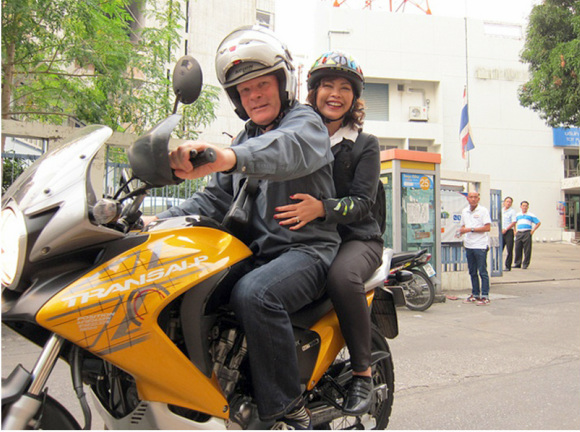How Ratanawadee (Ratana) Hemniti Winther, country director of Asia Injury Prevention (AIP) Foundation Thailand, hopes to get kids wearing crash helmets through a series of school-based programs
By Maxmilian Wechsler
By Maxmilian Wechsler
| FOLLOWING an article in the December BigChilli on how the motorcycle helmet law is commonly flaunted in Thailand, a number of readers responded with comments and suggestions. One of these was Ratanawadee (Ratana) Hemniti Winther, a Thai-born Canadian citizen and the wife of Mikael Hemniti Winther, the Danish Ambassador to Thailand (see last month’s magazine for an in depth interview with the ambassador). As the country director of Asia Injury Prevention (AIP) Foundation Thailand, Khun Ratana has devoted an incredible amount of time and energy to promote helmet wearing, especially for children. In fact her interest and work in this area began before her association with AIP. |
| “I first learned of AIP Foundation when my husband Mikael and I were living in Vietnam, where he worked as a diplomat at the Danish Embassy,” said Khun Ratana, who invited us last month to meet her at her residence. “I had the opportunity to travel quite extensively around the country, and as I did I observed some of AIP’s activities, such as using billboards to promote the use of safety helmets. It got me thinking and I admired their work.” “After we left Vietnam, I had work assignments that took me back to the country, in particular a capacity building project in road safety. The project was an innovative partnerships for development initiative under the International Danish Development Assistance Program (DANIDA) that required identifying key partners within the sector. “As a prominent NGO running a very effective awareness raising campaign, AIP naturally was one of those identified. We worked closely together, and when Mikael and I came to Thailand at the end of 2010, AIP happened to be looking for a country director and offered the position to me. I decided to take on the responsibility and started the job at the beginning of 2011.” Khun Ratana explained that AIP’s mission is to provide traffic safety knowledge and skills to the developing world with the goal of preventing road traffic fatalities and injuries. The organization first began working in Thailand in 2006. “We concentrate our efforts on young children and educational and awareness raising activities in schools,” said Khun Ratana. “Through school-based programs, such as our signature program, Helmets For Kids (HFK), we empower a new generation of safer, smarter road users to make intelligent decisions |
about their actions on the road. We aim for more sustainable change by combining the expertise, political motivation, and financial support of private and public sectors.
HFK, which launched in Hanoi, Vietnam, with a special event attended by former US President Bill Clinton, is currently active in Vietnam, Cambodia, and Thailand.
“We have been trying to make the HFK program more responsive to local needs and requirements,” explained Khun Ratana. “In Thailand HFK operates in schools to get kids to wear helmets and to instill a safety culture among them.
“HFK starts with helmet donations to children. After the helmets are distributed, we provide teacher training and non-classroom activities throughout the year to raise awareness about wearing helmets and how to wear them correctly, and also on road safety in general. We also monitor helmet use by children three or four times during the school year.
“The method we use to monitor helmet wearing in schools was developed by the US Centre for Disease Control in Atlanta, and it has been given priority in all our HFK programs so we know exactly how well we are doing.”
AIP works closely with the Thai government and key road safety stakeholders in the public and private sectors. It has membership in the Ministry of Education’s road safety committee and a sub-committee under the National Road Safety Directing Center.
“In early 2010, we signed a memorandum of understanding with the Department of Disaster Prevention and Mitigation (DDPM), under the Ministry of Interior, to cooperate in the national helmet wearing campaign, particularly among children. These relationships have facilitated our operations in Thailand. For instance, when we are out in the provinces, we get a lot of cooperation from provincial administration agencies and related education bureaus. When appropriate, we sometimes meet with potential funders together with DDPM representatives.
“With the help of the DDPM, AIP launched the Thailand Helmet Vaccine Initiative (THVI) in Ayutthaya province’s Talad Kriep in July 2012. The overall strategy of THVI is modeled after the global HVI program established by AIP and its main partners, such as Fédération Internationale de l’Automobile (FIA) Foundation and the CDC. Besides Thailand, there are country specific HVI programs in Cambodia, Uganda, Vietnam and a few other countries. A couple of years ago, AIP started a program in a remote city in southern China.”
As with HFK, the focus of THVI is on school children. THVI conducts campaigns and activities with parents, police and the general public. The program has been expanded to several more schools in Bangkok and surrounding areas. In addition, the AIP has been running a large educational campaign in two schools in Udon Thani in cooperation with its partners.
When asked about the challenges AIP faces in getting kids to wear helmets in Thailand, Khun Ratana replied: “At the primary school level, we find parents are the key. Parents need to be much more involved and aware of how dangerous it is when their kids don’t wear helmets as passengers.
HFK, which launched in Hanoi, Vietnam, with a special event attended by former US President Bill Clinton, is currently active in Vietnam, Cambodia, and Thailand.
“We have been trying to make the HFK program more responsive to local needs and requirements,” explained Khun Ratana. “In Thailand HFK operates in schools to get kids to wear helmets and to instill a safety culture among them.
“HFK starts with helmet donations to children. After the helmets are distributed, we provide teacher training and non-classroom activities throughout the year to raise awareness about wearing helmets and how to wear them correctly, and also on road safety in general. We also monitor helmet use by children three or four times during the school year.
“The method we use to monitor helmet wearing in schools was developed by the US Centre for Disease Control in Atlanta, and it has been given priority in all our HFK programs so we know exactly how well we are doing.”
AIP works closely with the Thai government and key road safety stakeholders in the public and private sectors. It has membership in the Ministry of Education’s road safety committee and a sub-committee under the National Road Safety Directing Center.
“In early 2010, we signed a memorandum of understanding with the Department of Disaster Prevention and Mitigation (DDPM), under the Ministry of Interior, to cooperate in the national helmet wearing campaign, particularly among children. These relationships have facilitated our operations in Thailand. For instance, when we are out in the provinces, we get a lot of cooperation from provincial administration agencies and related education bureaus. When appropriate, we sometimes meet with potential funders together with DDPM representatives.
“With the help of the DDPM, AIP launched the Thailand Helmet Vaccine Initiative (THVI) in Ayutthaya province’s Talad Kriep in July 2012. The overall strategy of THVI is modeled after the global HVI program established by AIP and its main partners, such as Fédération Internationale de l’Automobile (FIA) Foundation and the CDC. Besides Thailand, there are country specific HVI programs in Cambodia, Uganda, Vietnam and a few other countries. A couple of years ago, AIP started a program in a remote city in southern China.”
As with HFK, the focus of THVI is on school children. THVI conducts campaigns and activities with parents, police and the general public. The program has been expanded to several more schools in Bangkok and surrounding areas. In addition, the AIP has been running a large educational campaign in two schools in Udon Thani in cooperation with its partners.
When asked about the challenges AIP faces in getting kids to wear helmets in Thailand, Khun Ratana replied: “At the primary school level, we find parents are the key. Parents need to be much more involved and aware of how dangerous it is when their kids don’t wear helmets as passengers.
“As you can see, many kids do not wear helmets when they ride motorbikes with their parents. In our programs we ask school principals to send out letters of commitment and to organize parent meetings, but it is still hard. With older kids, it’s even harder. If they don’t develop safe habits when they are younger, it is difficult to get them to wear helmets. So it really comes down to enforcement of the laws. There have to be more efforts and resources devoted to this. Enforcement is something that we seriously need in Thailand.”
According to Khun Ratana, in Thailand only about 46% of motorcycle riders and passengers wear helmets overall, and statistics show that the percentage of children wearing helmets in Thailand is alarmingly low, even in comparison with some other Southeast Asian countries − below five% in many provinces. In Vietnam it is around 20%, a figure that she stresses is also far too low.
“Vietnam has a very high overall rate of helmet wearing, and it is illegal to transport children aged over six on a motorcycle if they are not wearing helmets. But our research shows that while nearly 90 per cent of adults wear helmets, only about one in five child passengers do. In Cambodia, two thirds of road crash fatalities in 2012 involved motorcyclists, but only six per cent of passengers, including children, wear helmets when they ride.
“However, our campaign in Cambodia is showing very positive results. Kids love the helmets we have given them. A sponsor of our HFK program in some schools outside Phnom Penh made several unannounced visits and was very pleased to see a high percentage of children wearing helmets.”
Khun Ratana said that a reluctance to wear helmets by adults in Thailand and other places is reflected in the attitudes of children. “Many adult motorbike users have a very relaxed attitude toward safety. About 64% of adults say they don’t feel it’s necessary to wear a helmet if they aren’t going far. Safety is just not a priority. So many adults have not been good examples and too few tell their children to wear helmets.” Concerning the quality of helmets for kids sold in Thailand, Khun Ratana said: “Although the AIP has its own not-for-profit helmet factory in Vietnam, we use helmets produced here in Thailand due to different safety standards in the two countries. However, the helmets the AIP produces in Vietnam are comparable in terms of safety to those endorsed by the Thai Standard Bureau.
“Unfortunately there are many sub-standard helmets sold here, as there are in Vietnam,” added Khun Ratana. “As for other protective riding gear for kids, at the moment we have not touched on this issue. It’s also important to consider factors like excessive speed. Even good quality helmets cannot protect anyone from death or serious head injury at speeds above 40 to 50 kilometers per hour.
“Regarding our future plans, in Thailand we are continuing efforts in our THVI strategy and joining with the DDPM and our partners in the national campaign for 100% helmet use. At this time we have a three-year commitment from UPS International and FIA Foundation to support HFK in Thailand, Vietnam and Cambodia, and we have other school programs funded by the private sector. Our donors include, among others, Diversey, Sigma, Rotary Club, Pandora, Ecco, and 3i Engineering.”
Khun Ratana is involved in other non-profit operations besides AIP. Last year she was chairperson for the Diplomatic Participants’ Committee. “We got together to help the Thai Red Cross raise funds for several projects, such as a craniofacial operation project, hare-lip and cleft palate operations, breast cancer research, and providing spectacles for underprivileged children and the elderly. I am still active with DPC.”
She also helps raise funds for YWCA charity projects which concentrate on helping needy people living in remote areas. Recently, she joined a well-known wheelchair-bound TV personality in his campaign to promote design and architecture to benefit people with disabilities.
According to Khun Ratana, in Thailand only about 46% of motorcycle riders and passengers wear helmets overall, and statistics show that the percentage of children wearing helmets in Thailand is alarmingly low, even in comparison with some other Southeast Asian countries − below five% in many provinces. In Vietnam it is around 20%, a figure that she stresses is also far too low.
“Vietnam has a very high overall rate of helmet wearing, and it is illegal to transport children aged over six on a motorcycle if they are not wearing helmets. But our research shows that while nearly 90 per cent of adults wear helmets, only about one in five child passengers do. In Cambodia, two thirds of road crash fatalities in 2012 involved motorcyclists, but only six per cent of passengers, including children, wear helmets when they ride.
“However, our campaign in Cambodia is showing very positive results. Kids love the helmets we have given them. A sponsor of our HFK program in some schools outside Phnom Penh made several unannounced visits and was very pleased to see a high percentage of children wearing helmets.”
Khun Ratana said that a reluctance to wear helmets by adults in Thailand and other places is reflected in the attitudes of children. “Many adult motorbike users have a very relaxed attitude toward safety. About 64% of adults say they don’t feel it’s necessary to wear a helmet if they aren’t going far. Safety is just not a priority. So many adults have not been good examples and too few tell their children to wear helmets.” Concerning the quality of helmets for kids sold in Thailand, Khun Ratana said: “Although the AIP has its own not-for-profit helmet factory in Vietnam, we use helmets produced here in Thailand due to different safety standards in the two countries. However, the helmets the AIP produces in Vietnam are comparable in terms of safety to those endorsed by the Thai Standard Bureau.
“Unfortunately there are many sub-standard helmets sold here, as there are in Vietnam,” added Khun Ratana. “As for other protective riding gear for kids, at the moment we have not touched on this issue. It’s also important to consider factors like excessive speed. Even good quality helmets cannot protect anyone from death or serious head injury at speeds above 40 to 50 kilometers per hour.
“Regarding our future plans, in Thailand we are continuing efforts in our THVI strategy and joining with the DDPM and our partners in the national campaign for 100% helmet use. At this time we have a three-year commitment from UPS International and FIA Foundation to support HFK in Thailand, Vietnam and Cambodia, and we have other school programs funded by the private sector. Our donors include, among others, Diversey, Sigma, Rotary Club, Pandora, Ecco, and 3i Engineering.”
Khun Ratana is involved in other non-profit operations besides AIP. Last year she was chairperson for the Diplomatic Participants’ Committee. “We got together to help the Thai Red Cross raise funds for several projects, such as a craniofacial operation project, hare-lip and cleft palate operations, breast cancer research, and providing spectacles for underprivileged children and the elderly. I am still active with DPC.”
She also helps raise funds for YWCA charity projects which concentrate on helping needy people living in remote areas. Recently, she joined a well-known wheelchair-bound TV personality in his campaign to promote design and architecture to benefit people with disabilities.





 RSS Feed
RSS Feed
















